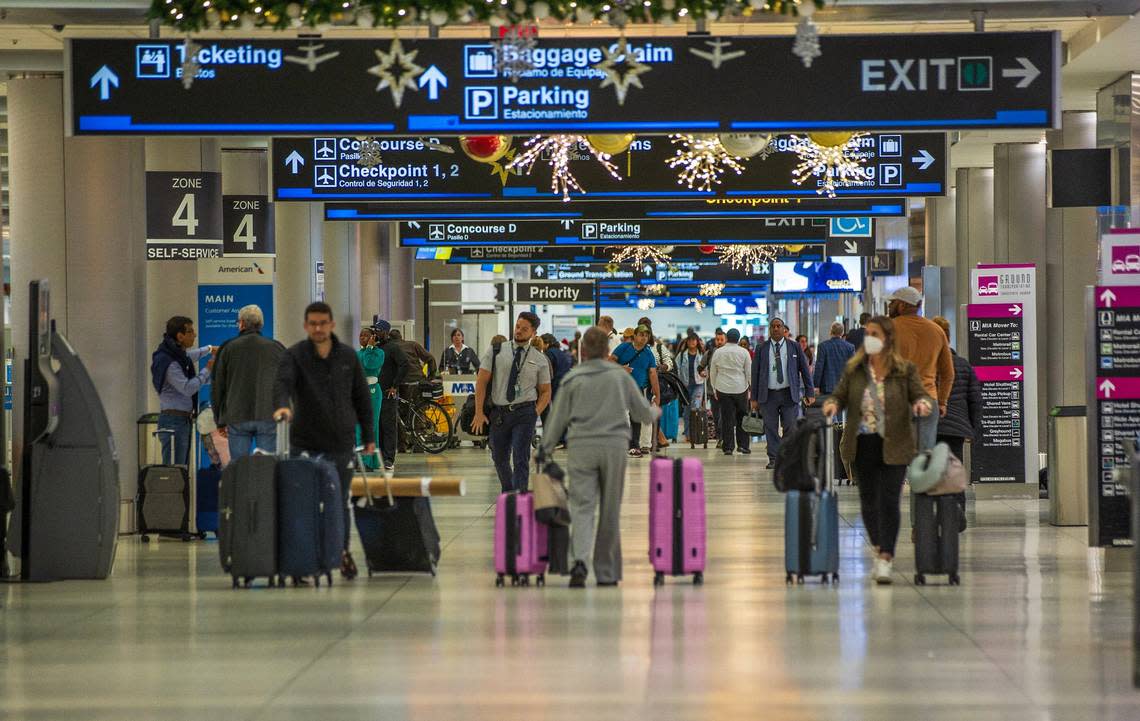Miami and FLL airports just got millions in federal money. Where will the funds go?

South Florida airports have experienced rapid growth in recent years and subsequent growing pains. Now, the Biden administration is providing them and others in the state millions in new funding to help alleviate their problems.
The Federal Aviation Administration said on Thursday it is awarding more than $112.5 million to 10 airports in Florida. The money comes from the federal infrastructure law and is part of the almost $1 billion going to 114 airports in 44 states and 3 territories across the country this year.
Florida though will receive more than any other state, said a spokesperson for the department of transportation.
Miami International Airport is getting $27 million. Fort Lauderdale-Hollywood International Airport is the biggest winner, getting $50 million, the highest single amount among all airports in the nation.
The new funding comes as complaints about the state of the Miami airport have gotten so bad that Miami-Dade County Mayor Daniella Levine Cava recently held a news conference there about the issues. Passengers have complained about broken elevators and escalators. Last September, Skytrain shut down. The system, which provides an alternative to long walks in Concourse D, American Airlines home, is not expected to be up and running until March.
More passengers at South Florida airports
The complaints are perhaps partly an inevitable consequence of growth.
Miami International Airport set a new record in traffic last year with 52.3 million passengers. That was a 3.2% increase over the 2022 figure of 50.7 million people, which until now was an all-time high, the airport said on Friday in disclosing audited full 2023 figures
Yet, the growth was driven entirely by international passengers, which jumped by 8.5% to 23.2 million. While that was a welcome sign for the local hotel industry that depends on them, it was also an indication that for Americans post-COVID, the world is wide open, and Miami is no longer the only game in town. It faces strong competition from Europe, Asia, the Caribbean, and the cruise industry.
Domestic travel at the Miami airport in 2023 was 29.1 million, down by 0.5% from the prior year,
Still, that number exceeds the 23.5 million visitors from within the U.S. that used the region’s largest airport in 2019, a sign that it and South Florida’s newfound relevance is likely here to stay.
Miami International Airport’s overall growth was largely driven by American Airlines, its main carrier. The carrier served 31.4 million passengers in 2023 and had an all-time 380 peak-day flights.
Meanwhile, Delta has also expanded its service out of Miami over the past 12-plus months. The Atlanta-based carrier said on Friday that it would start a non-stop daily year-round flight between Miami to Seattle starting next winter. That would give Delta 38 peak-day departures to 13 destinations from MIA and connect the Magic City to every Delta hub in the U.S.
New discount airlines like Norse Atlantic Airways and Porter Airways also started flying into Miami last year.
Air Serbia is in talks to start a nonstop direct flight between Miami and Belgrade later this year.
Miami International Airport now accommodates 96 passengers and cargo airlines.
Its cargo operation grew, too, reaching 2.78 million tons in 2023, a new record and 1% increase from 2022. About 80% of that was international cargo.
What the federal funds go for?
The $27 million from Washington going to Miami International Airport is for two projects:
▪ The first project is $12 million to fund the renovation of the airport’s people move connecting Lower Concourse E to the Concourse E-Satellite. The work includes “jacking of the existing structure, utility and facility adjustments, and replacement of guideway system components that have exceeded their useful life,” an FAA document noted. That project’s total cost is $17.8 million and Miami International Airport asked for $14.3 million.
▪ In the second project, $15 million was awarded to fund “a portion of the design phase for the modernization and redevelopment of the airport’s Central Terminal and Concourses E and F,” the FAA document said. The project’s total cost is $27.3 million and $21.9 million was requested from the federal government.
Fort Lauderdale airport funding
Fort Lauderdale-Hollywood International Airport came away with the biggest award, receiving the largest single grant among 114 airports nationwide.
FLL expects to have just over 35 million travelers in 2023 when the figures are fully reported. That’s up from 31.7 million in 2022. The airport is expected to grow in part because it is near Port Everglades, one of the country’s biggest seaports for cruise passengers. Last year, the port started a minimum 15-year agreement with Disney Cruises Lines.
The airport will get $50 million to partially fund a portion of a terminal connector past security checks. It also includes building two connector walkways and modifying existing terminals at security checkpoints, a bag hall, an expanded hold room and new retail space.
The initiative’s total cost is $221 million, and the airport asked for $145 million.
Other Florida airports
The funding comes from the Airport Terminal Program, one of three aviation programs in the Infrastructure Law, which offers $1 billion per year for five years for airport terminal program grants.
Other Florida airports receiving money include Palm Beach International Airport, Southwest Florida International Airport in Fort Myers, Orlando Sanford International Airport, and Space Coast Regional Airport in Titusville.

